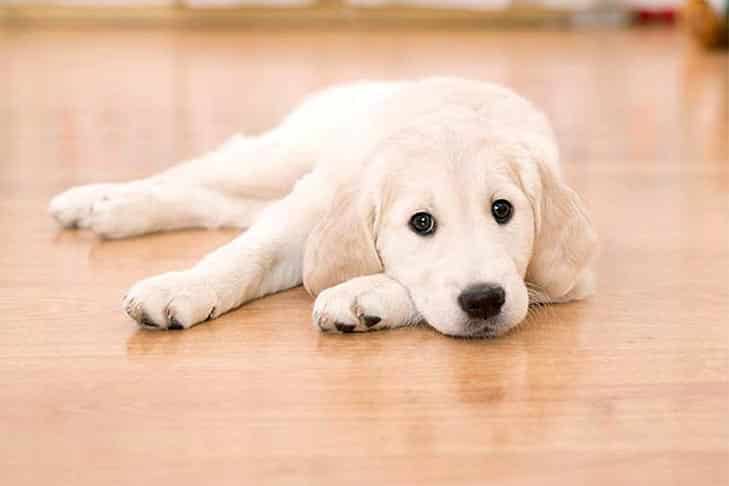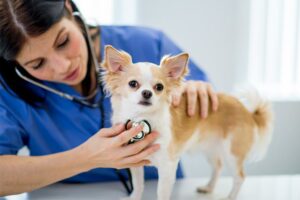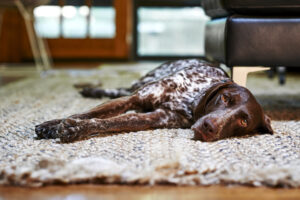There’s much to celebrate when welcoming home a new puppy. However, anyone who’s ever cared for a four-legged bundle of joy can tell you that it’s not always a walk in the dog park. For puppy owners in particular, providing daily care often means cleaning up messes and occasionally dealing with health emergencies. When a puppy comes down with diarrhea, it can mean juggling both jobs at once.
Three Common Causes of Diarrhea in Puppies
One of the reasons diarrhea can be so stressful for puppy owners is the sheer number of potential causes. Loose or watery stool might be a relatively benign response to everyday stressors, a reaction to something your dog ate, or signs of a potentially deadly condition.
Diarrhea on rare occasions is not necessarily alarming, but it’s important to note that diarrhea should be assessed with the puppy’s overall general health. Is the puppy alert? Are they eating? Is there vomiting as well? Is there blood in the diarrhea. Diarrhea in combination with lethargy, poor appetite, or vomiting can point to something more alarming and owners in these cases should not wait to contact a veterinarian. When in doubt, contact your veterinarian for guidance on whether your puppy’s case is routine or if it requires urgent attention.
Diet
Puppies have sensitive stomachs, and even subtle changes to their diets can result in unpleasant side effects like diarrhea. This is often a temporary nuisance, but it’s all the more reason to work closely with your veterinarian to devise a feeding plan. In addition to their dog food, curious young puppies may make a meal of anything they happen to find appealing. Garbage, feces, and other non-food items may lead to brief bouts of intestinal distress or present serious complications inside your dog’s digestive tract.

Infections
Your puppy’s digestive system isn’t the only part of its body that takes time to reach its full resiliency. Their immune system will get stronger and more resilient during their early months as well. This can leave growing dogs vulnerable to a range of both bacterial, viral, and parasitic infections. Make sure to discuss an appropriate vaccination schedule with your veterinarian to preemptively address conditions like distemper and canine parvovirus, which can sicken or kill unvaccinated puppies.
Stress
Daily life can be stressful, especially for a young puppy experiencing exciting firsts and milestones. Stress in dogs can cause symptoms like diarrhea, just like it can for humans! Thankfully, most puppies grow out of it.
Three Steps for Caring for Your Puppy’s Diarrhea
If the cause of your puppy’s sudden diarrhea isn’t obvious, follow these steps to help make sure you don’t both have a health emergency on your paws.
Monitor Your Dog’s Symptoms
Pay close attention to your dog and their bowel movements when they’re experiencing diarrhea. As symptoms resolve or worsen, dog owners should report changes to their veterinarian while providing hydration and comfort.

Introduce a Bland Diet
Veterinarians often suggest that older dogs skip meals when they’re experiencing bouts of diarrhea. For growing puppies, fasting is usually not advisable. Bland, stomach-soothing foods like boiled chicken, rice, and pureed pumpkin can temporarily help your pup manage symptoms while keeping something in their tummies. However, always be sure to consult your veterinarian before introducing a new food into your puppy’s diet.
Get a Sample
It’s nobody’s favorite part of caring for a puppy, but collecting stool samples could be the fastest way for your veterinarian to diagnose the cause of symptoms like diarrhea. Testing your dog’s feces can help identify the underlying cause, or at least rule out potential culprits, and develop a treatment plan. Lastly, when handling a puppy with diarrhea, always practice good hygiene and wash your hands after dealing with them, particularly in homes with very young children or immunocompromised individuals.
Three Ways to Help Prevent Puppy Diarrhea
When it comes to common puppy conditions like diarrhea, prevention is often easier, less stressful, and cheaper than treatment. New dog owners can help avoid digestive mishaps by taking a few simple precautions.
Close Garbage Cans and Drawers Securely
Some puppies will stick their snouts almost anywhere, and this can lead to an upset stomach if their nose leads them to something they should not eat. Keeping garbage cans securely closed can prevent dogs from chowing down on less-than-appetizing morsels. Always be sure to keep pups away from cleaning products and medications as well.

Keep Up With News
Puppy and dog food recalls are more common than you might like to think. By regularly checking in with Food and Drug Administration alerts, pet owners can ensure the food they are currently feeding isn’t subject to any recalls or advisories.
Trust Your Veterinarian
You can reduce many puppy diarrhea risk factors by working closely with your veterinarian. Ask before making major changes to your dog’s diet. Also, inquire about extra precautions you can take both indoors and out to help keep your dog healthy.








